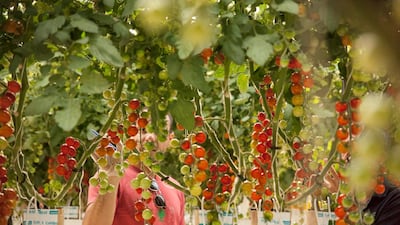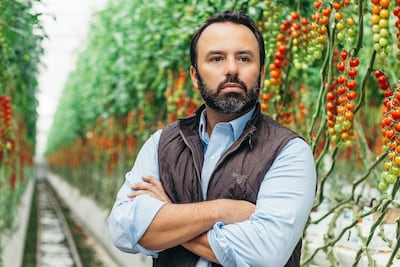Abu Dhabi agri-tech start-up Pure Harvest Smart Farms secured a multi-stage investment commitment of $100 million (Dh367m) with Wafra International Investment Company to fund hiring and massive expansion of its sustainable greenhouses in the UAE and Saudi Arabia.
Wafra is leading Pure Harvest’s $20.6m Series A financing round with an initial $10m, the first step in a multi-phase regional growth plan that will include increasing headcount from 19 to 90, and a new six-hectare farm in Riyadh, Saudi Arabia, the company’s first foray into the kingdom.
Pure Harvest will have at least 10 hectares of farming space over three sites, at its existing space in Abu Dhabi and at new farms in Al Ain and Riyadh, increasing production capacity fifteen-fold over the next year.
"The global need for innovation in agriculture has never been greater," Sky Kurtz, the founder and chief executive of Pure Harvest, told The National.
“The coronavirus pandemic further highlights the need for sustainable local-for-local food production capacity, especially for fresh, nutrient-rich foods.”
Wafra, a wholly owned asset management subsidiary of Kuwait’s Public Institution for Social Security, has assets under management of approximately $6 billion. Ghazi Al-Hajeri, chief executive of Wafra, will join Pure Harvest’s board of directors.
"No matter what happens in the market, food is a necessity of life," Yousef Ghareeb, assistant vice president at Wafra, told The National.
“We depend on imported foods more than anything else”, he added, saying that food security - particularly amid the region’s Covid-19 response - is a priority in Kuwait.
Pure Harvest is in talks to develop farm systems in the country, but Mr Ghareeb said the UAE and Saudi Arabia were priorities because of the potential market size, with a total addressable population of about 39 million.
The Gulf Co-operation Council (GCC) states import as much as 90 per cent of the food consumed, according to Chatham House. While the hot, humid and/or arid climate makes farming extremely challenging, advances in technology put climate management and sustainable agriculture within reach for those with the capital and know-how.
Pure Harvest’s greenhouse controls the temperature and humidity levels through software and hardware. In 2018, it yielded its first tomato crops. Recently, Pure Harvest began experimenting with growing greens and berries in its beta greenhouse.
When compared to traditional field farming, the company’s agri-tech model is 32 times more water-efficient while producing 17 to 23 times more food per area. Produce is an estimated 20 to 40 per cent cheaper than imported fresh foods.
Today, Pure Harvest sells five tomato varieties through retail, hotels, restaurants and catering channels. They include supermarkets such as Carrefour, Spinneys and Waitrose; direct-to-consumer Farmbox; and the Jumeirah Group.
For its part, the UAE is looking to boost local food production by 40 per cent, according to the UAE Ministry for Food Security. In 2018, it rolled out the National Food Security Strategy, setting a target of improving agricultural yield by 30 per from new technology-enabled production methods.
Earlier this week, Sheikha Shamma bint Sultan bin Khalifa Al Nahyan, founder and chief executive of Alliances for Global Sustainability, announced a strategic land, capital and advisory partnership with Pure Harvest.
The partnership will secure over 30 hectares of land in Abu Dhabi’s Al Ain area. The specific site being made available to Pure Harvest holds historic significance, having been passed down directly from the late Sheikh Zayed.
In conjunction with the partnership, Sheikha Shamma will join Pure Harvest’s Advisory Board as an investor and ‘sustainability advisor’.
“Food security has always been a top priority for the UAE leadership, who has been adamant to ensure that all members of our community have secure and consistent access to healthy, nutritious, sufficient and affordable food at all times,” Mariam Almheiri, Minister of State for Food Security, said of the new partnership.
“This kind of project and these partnerships we are forming aim to increase food production, moving from the proof-of-concept phase to concrete, innovative hi-tech projects with proven business scalability and commercial viability.”
Mr Kurtz said the business had so far been “unaffected” by the Covid-19 pandemic, with retail sales making up for losses in restaurant and hospitality sales.
Their 14 farmers have been self-isolating since early March.



